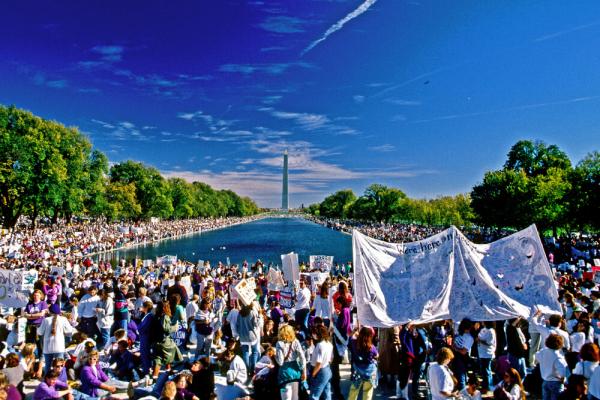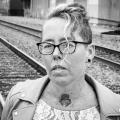In a recent interview with Krea Gomez of the Young Women’s Freedom Center, I asked her about how faith informs secular organizing and how she saw faith based and secular organizers working together. Her insights on shared goals and strategies and movement building inspired me to interview a faith leader about how he sees faith and organizing. Michael McBride of The Way Church and is known for his faith and his organizing, working in issues like prison reform, economic justice, gun violence, racial justice, and much more. I interviewed Pastor McBride at his office in Berkeley, Calif.
This piece has been edited lightly for clarity and length.
Dani Gabriel, Sojourners: Can you tell me about your church?
Michael McBride, The Way Church: The Way Church is a predominantly African American Pentecostal Charismatic church. I grew up attending this church my whole life. It comes out of a Black Holiness Pentecostal tradition. Currently we serve lots of Christ followers, religious folk, agnostic seeking folks who were, I think, very serious about their faith walk and encounter with God through the Christian tradition, and [ have a ]deep commitment to justice and issues of addressing human hierarchy.
Gabriel: Will you say a little bit about your work with PICO?
McBride: The Faith in Action Network, formerly called PICO, is a 40 plus year congregation-based organizing network. It's multi-faith in its orientation. We organize faith congregations in organizations across the country [ and] work on issues of racial justice, economic justice, access to affordable health care, immigration reform, all the many ways that we are trying to dismantle white supremacy, human hierarchy, the predatory nature of our economic system, etc.
I lead the Live Free and Urban Strategies division of the Faith in Action Network. In this division, we are focused squarely on addressing urban gun violence, focusing on addressing issues related to mass incarceration and dismantling the new and rising tools of voter suppression, particularly targeting people of color, black folks in the South, and other high demographic spaces where black folks live.
Gabriel: How do you collaborate with non-faith-based organizers?
McBride: As we engage folks who are victims of violence in all these many forms, we try to bring hope, we try to bring a sense of dignity and community. Institutions change systems. Individuals rarely are able to do it alone. We try to lend our institution as a hub, or a power center, that can gather people, help amplify issues that are of common concern, and hopefully dismantle systems, change narratives, save bodies and souls, and encourage the minds and the hearts of people who find themselves often wilting under the obvious pressure of evil, systemic, and social evil.
Our church takes very seriously this idea that we are to be the light of the world. We try to do that with both secular and religious organizations who may have a different orientation to the world, but a shared commitment to justice, a shared commitment to peace and the safety of everyone, even people we may not always see eye to eye on about issues of theological, cultural, human sexuality, or political persuasion. We try to ensure that people's lives and bodies should be protected no matter what. We can work all the other very important issues out as we walk together through the course of our lives. I hope the way we interact with secular organizations reflects the way we interact with each other in our space.
Gabriel: Can you say a little bit about how the baggage of the church influences what you're trying to do?
McBride: I think that white supremacy has too often found a home in the American church. I think human hierarchy has too often found a home in probably most institutional relationships throughout history. Issues of misogyny, issues of sexism, elitism, exploitation, oppression, bias, violence, all of these things have continued to be a particular challenge of the church historically. I think any of us who are serious about being faithful in the 21st century have to lean into a legacy that has that baggage, but also lean forward into a future that is about faithfulness. I don't ask our congregation to strive for perfection, I ask them to strive for faithfulness.
Gabriel: How does your personal faith inform your work, and what core beliefs drive that work?
McBride: I'm a four generation Holiness Pentecostal, as I stated. I speak in tongues, I shout and holler and sing, swing from the chandeliers. On a good Sunday, I levitate. To me, to be black and Pentecostal means that I believe the text where it says, "In the last days, God will pour out God's spirit on all flesh. Sons and daughters will prophesy, old men shall see visions, young men shall dream dreams. Even on my handmaiden and hand servant will I pour out my spirit. Everyone who calls on the name of the Lord shall be saved." This idea of all flesh is very important, it's become increasingly important for me. When the text talks about on the last day, God will pour out his spirit on all flesh, sons and daughters, it speaks to sexism. Old and young speaks to ageism. Maidservant and hand servant speaks to class. There's a sense in being Pentecostal, if we take it to its final conclusion, it's very hard to believe that if God is pouring out God's spirit on all flesh, that people will be left out.
The sense of justice really flows out of my own experience of being a victim of sexual and physical assault at the hands of police officers. Being brutalized and mishandled by the systems of this world, and knowing that this was happening to many of my young people, converted me to the necessity of justice. I can't just be about personal holiness in a world that has social evil running amok. That social evil is actually destroying the hearts, minds, souls, bodies of people who are striving to achieve personal holiness, or just achieve some form of human flourishing.
That has been, for me, a really important part of how I think about my work, and our calling, and my ministry. I try to believe that Jesus is interested in the saving of souls and bodies. I try to believe that my leadership, as all leadership, matters in this regard. I try to stay close to the people who are suffering, and allow my suffering and their suffering to speak, and to lead and guide us, and prayerfully, I, we can make a difference.
Gabriel: Why should Christians in particular be interested in organizing?
McBride: Disorganized truth will find it difficult to defeat an organized lie. That's one of the things that a Muslim mentor of mine, with the Nation of Islam, told me. I believe that. I think that if we do not organize Christians, inform Christians, help Christians understand the deep ways that social evil plays itself out in society, Christians will be either, consciously or unconsciously, complicit with oppression. I think our history, again, has shown us that the stakes are high. It's a deep, deep wound, and failure of our public witness, when that happens. We cannot preach the gospel well if we are so disorganized when it comes to the stewardship of God's creation.
That's why I think we have to organize. We have to organize among ourselves, we have to organize with people who love peace and justice. I was reading the lectionary text this week about the disciples who were upset that there were folks out there casting out devils in Jesus' name. The disciples asked Jesus to tell them to stop. Jesus said, no. I have people out there doing this work that I haven't even called yet. If they're not against you, then that means they're probably on your side.
I think Christians have to organizie because it helps us to broaden whatever kind of tunnel vision some of our own traditions unwittingly produce in this fundamentalist age. I often tell my congregation that organizing, justice work, is essential for Christian discipleship, because it helps our heart become less wicked. It puts you in relationship and conversation with both systems and individuals that you may need to learn from, or you may need to help transform. I think organizing is critically important in that way.
Gabriel: How can faith based and secular organizers create a unified movement together?
McBride: I think that, at least on the faith-based side, I think we should not buy into these false dichotomies. Like I said, people in our congregations are literally running or serving in secular organizations. Some of these frameworks, I think, are diabolical in how they ... bear out the way in which we live.
I think some of these frames, I think, actually create dissonance where there doesn't need to be dissonance. I think we all should appreciate, sometimes, we serve primary, secondary, maybe sometimes tertiary roles in different parts of people's lives. I think faith-based institutions have to own our institutional footprint that we serve in our communities, that we cannot abdicate that. I think secular organizations have to appreciate that the majority of people in this country hold some kind of religious orientation. We can be partners, at our best, for peace and justice, and inclusion. At our worst, we can be tools of the empire. I think we all should not be too arrogant about the inherent goodness of institutions. I think institutions are always comprised of people. If religious and faith-based institutions can form and shape people well, secular institutions can help provide services, and we all can be married together in a way that is complementary. I think we'll be much better off.
Got something to say about what you're reading? We value your feedback!







